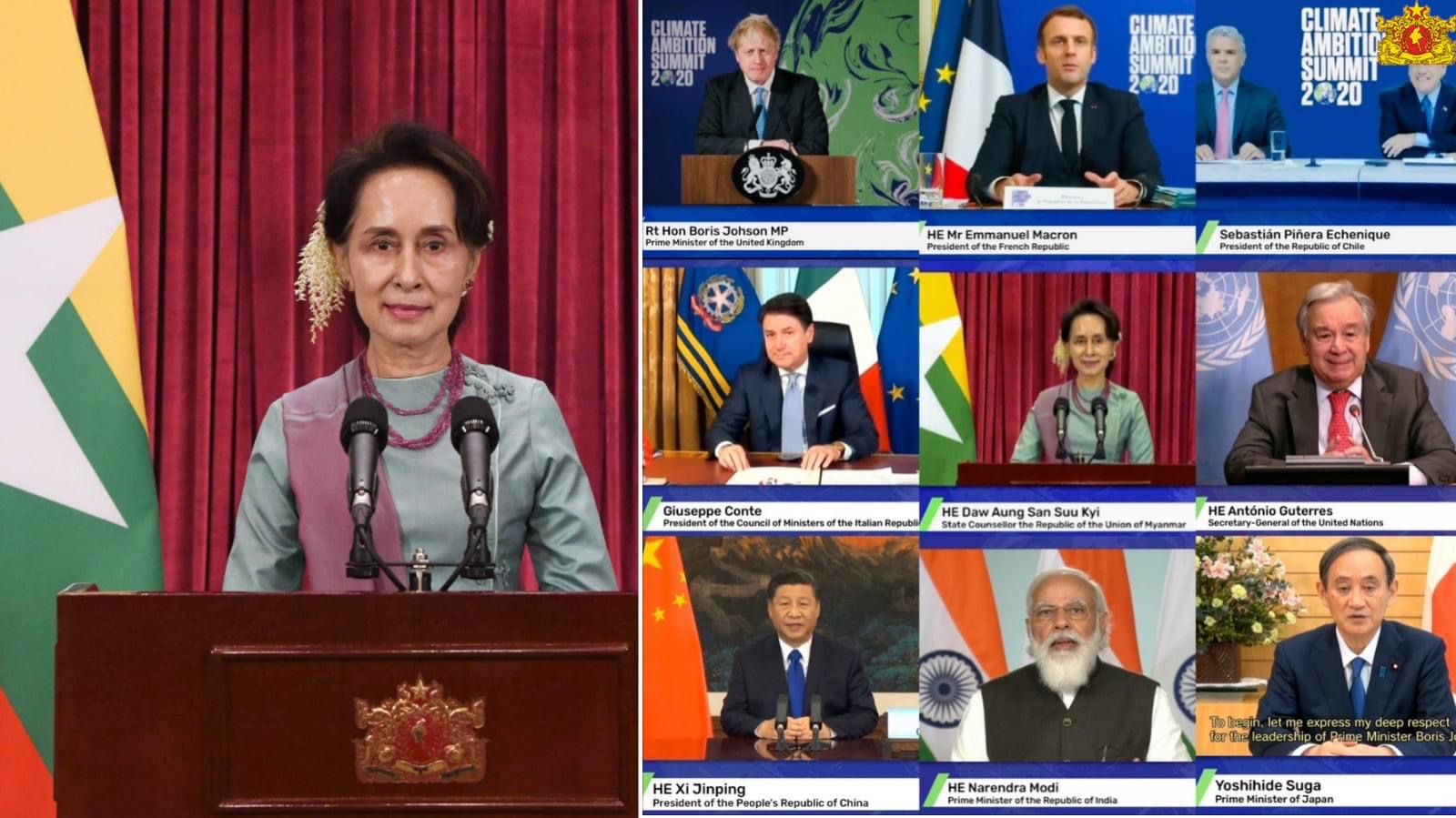YANGON—Myanmar’s State Counselor promised to submit a national climate action plan by the end of the year that includes commitments to reduce the country’s carbon emissions by hundreds of millions of tonnes, in her comments to the international Climate Ambition Summit.
During the online summit to mark the fifth anniversary of the Paris Agreement, State Counselor Daw Aung San Suu Kyi said Myanmar would submit its Nationally Determined Contribution (NDC) by the end of 2020, adding that the plan aims to reduce carbon dioxide (CO2) emissions by over 243 million tonnes by increasing the share of renewable energy to 39 percent and reducing net emissions from the forestry sector by 25 percent.
NDCs, the national climate action plans known as the heart of the Paris Agreement, include climate action plans and climate-related targets and policies, and measure governments’ responses to climate change. The Paris Agreement requests that member countries submit updated NDCs every five years to the secretariat of the United Nations Framework Convention on Climate Change (UNFCC).
Moreover, Daw Aung San Suu Kyi said Myanmar aims to cut 105.2 million tCO2e (metric tonnes of carbon dioxide equivalent) in the energy sector and 123.6 million tCO2e in the forestry sector.
Myanmar’s National Adaptation Plan for climate change is projected to be complete by 2024, she added.

Myanmar is highly vulnerable to climate change. The Global Climate Risk Index 2020 listed Myanmar, Puerto Rico and Haiti as the countries with the highest weather-related losses in the past two decades. Moreover, Myanmar’s fossil CO2 emissions amounted to 16,701,776 tons in 2016, an increase of 5.61 percent compared with 2015.
According to the State Counselor, to expand its carbon sinks, Myanmar has set a target of increasing its Protected Area Systems to cover 10 percent of total national land. (A carbon sink is a natural feature that removes carbon from the atmosphere.) Moreover, Myanmar is committed to preserving 0.59 million hectares of reserved forests and engaging in management of 0.25 million hectares of forest plantation on public and private land in line with the Myanmar Reforestation and Rehabilitation Program (2017-2027).
On energy efficiency, Myanmar has committed to improvements of 7.8 percent in the residential sector, 6.6 percent in the industrial sector, 4 percent in the commercial sector and 1.36 percent in other sectors by 2030, the State Counselor said.
Moreover, Myanmar plans to distribute 5.1 million fuel-efficient stoves to reduce emissions by approximately 5.99 million tCO2e in 2021-2030.
U Win Myo Thu, the chairperson of the Green Motherland Development Association and director of EcoDev Myanmar, one of the leading environmental organizations in Myanmar, welcomed the government’s commitment to the climate action plan, including its targets and measures, saying it would improve green investment in the country.
U Win Myo Thu said some commitments had already been implemented in Myanmar since the National League for Democracy-led government took office in 2016, but energy efficiency commitments are completely new. He said these were made possible by the application of many policy changes in commercial centers, including Yangon, when it comes to constructing new buildings.
“Every new building will need to be [constructed] in line with the energy efficiency commitments. So, they need to assemble all the materials that could improve energy efficiency including air-conditioning systems,” U Win Myo Thu said.
However, he said the government’s targets for preserving Reserved Forests and reforesting areas on public and private land are still quite low, adding that Myanmar is losing an average 1 million acres (404,685 hectares) of forest yearly.
He described the government’s forestation targets as “like a drop in the ocean” compared to what is needed.
Under the Paris Agreement, member countries commit to reducing national emissions and adapting to the impacts of climate change, including limiting global warming to “well below 2 degrees [Celsius] above pre-industrial levels” while attempting to limit the increase to 1.5 degrees.
U Win Myo Thu said “governments mostly have to carry out environmental commitments based on their own plans and budgets, so Myanmar needs to draw up a plan and explain its pros and cons.”
“I think that the action plans will move forward quickly if we can get help [on actual implementation] from the international community,” U Win Myo Thu added.

















